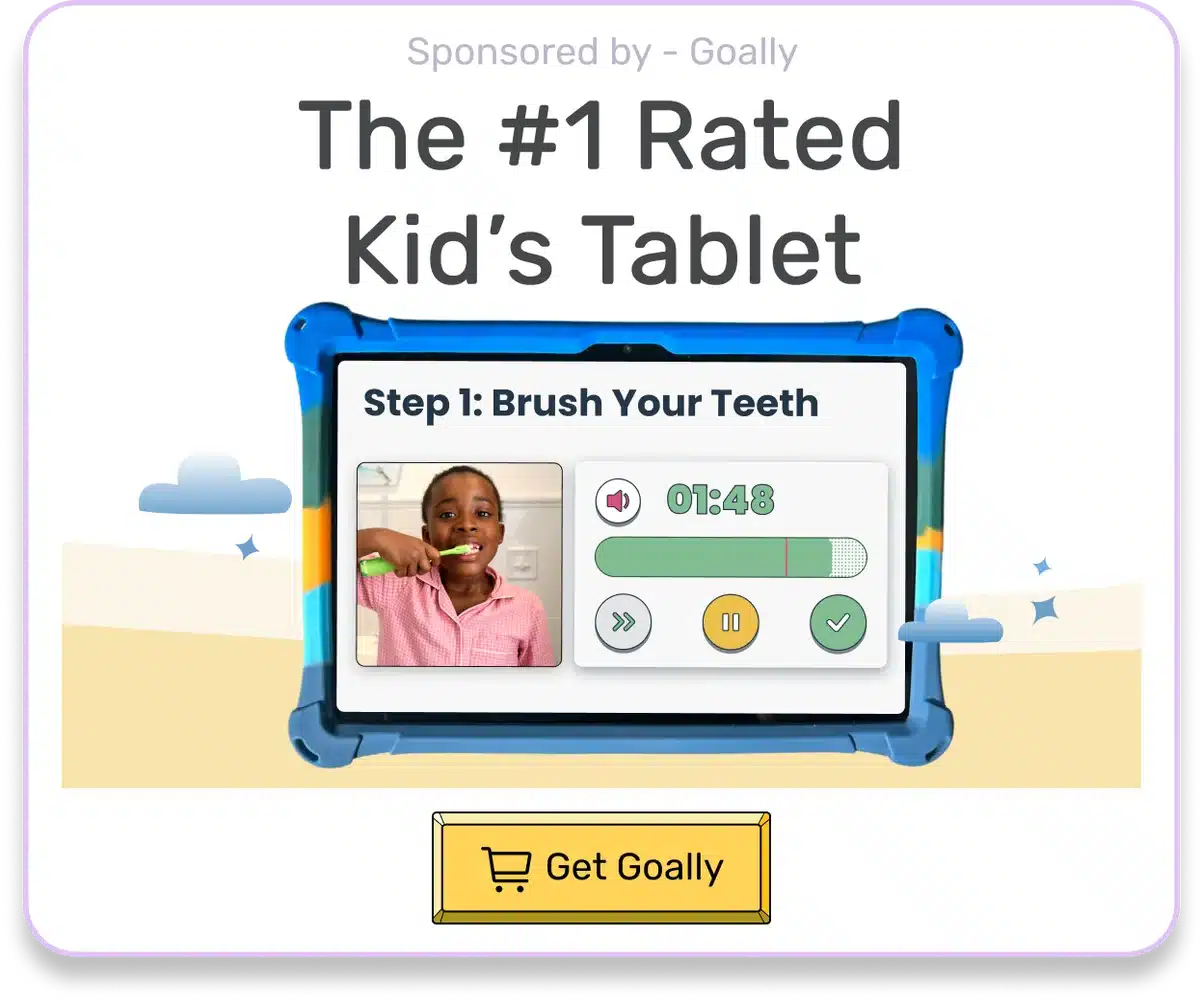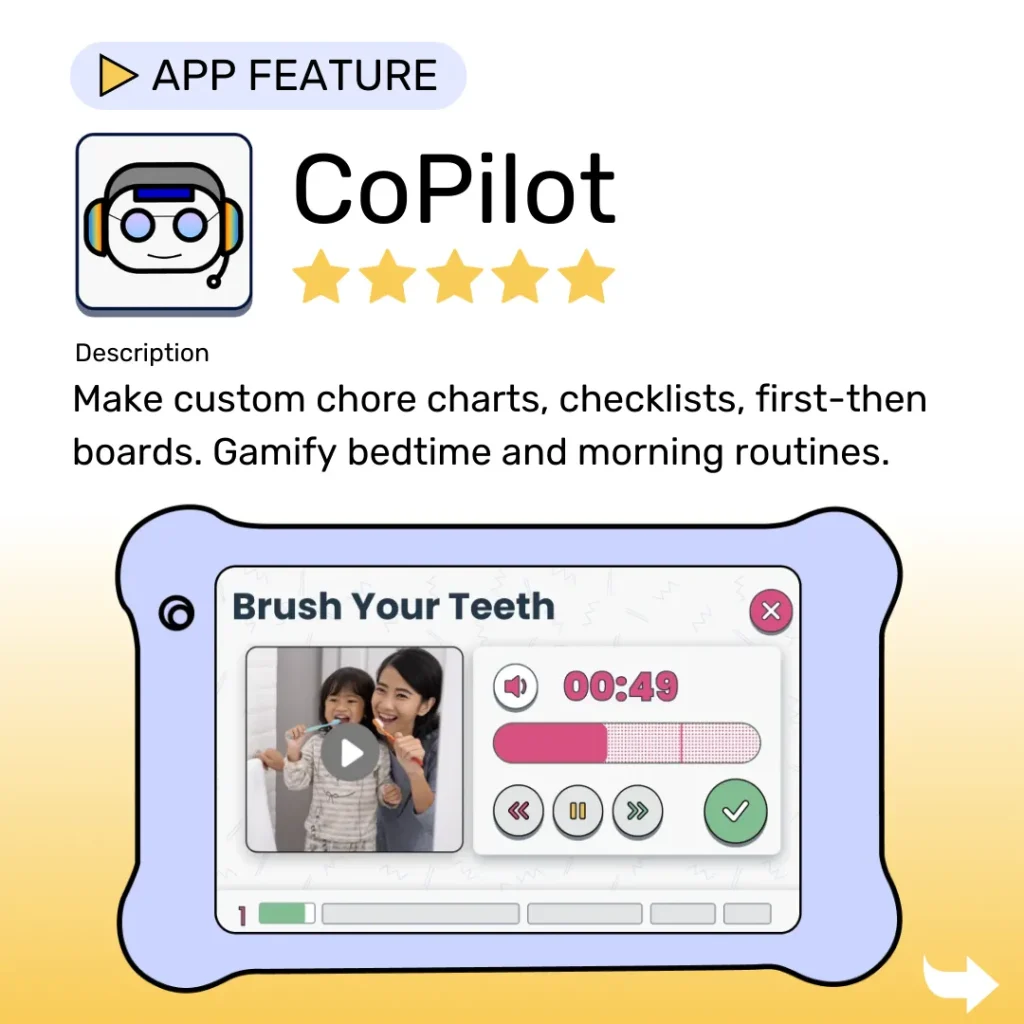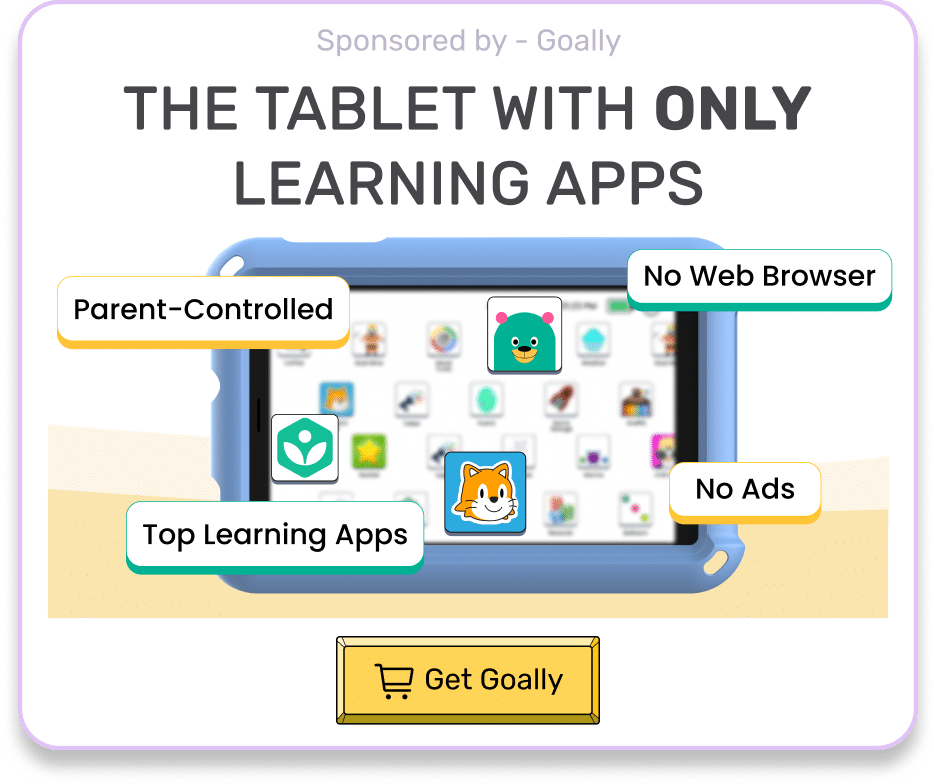Attention, parents of preschoolers! Get ready for an exciting discovery that will make learning fun and engaging for your little ones. We’ve found the most groundbreaking educational games for preschoolers in 2024, carefully designed to help them develop crucial skills while having a blast. Whether your child is neurodiverse or neurotypical, these fantastic games will inspire a love for learning and set them up for success in their early education journey.
Table of Contents
#1 Goally
Goally is a preschool learning tablet designed for kids ages 3-6. It’s fascinating as it comes loaded with expertly curated games and activities focusing on essential preschool skills like letter and number recognition, reading readiness, basic math concepts, problem-solving, and critical thinking. I love that the games are super engaging and adaptive, so they adjust to your child’s individual learning pace. Goally also offers parental controls and progress tracking, which makes it a favorite among parents! As an added bonus, most educational activities are available offline, which makes this tablet a super companion for car rides and travel!
Goally | The Safest Tablet for Kids

#2 Osmo
Osmo combines physical game pieces with a tablet or iPad to create a unique and interactive learning experience. They offer a variety of kits that tackle subjects like coding, math, spelling, and even drawing. Children manipulate the real-world game pieces, and the Osmo technology brings those actions to life on the screen. Osmo games are fantastic for helping kids develop spatial reasoning, problem-solving, and fine motor skills.
#3 Counting Games
Sometimes, the best learning games are the simplest. Counting games help preschoolers grasp the basics of numbers and quantities. You can easily play these games with everyday objects around the house. Here are a couple of ideas:
- Object Counting: Gather a collection of small objects like buttons, blocks, or even cereal pieces. Have your child count the objects out loud. For older preschoolers, write down numbers and help them match the correct number with the corresponding pile of objects.
- Counting Songs and Rhymes: Many catchy songs and rhymes help preschoolers learn to count. Popular ones like “Five Little Monkeys” or “The Ants Go Marching” make counting fun and engaging.

Read more: Free Printable Preschool Behavior Charts
#4 Word Games
Word games are a great way to introduce preschoolers to the basic building blocks of language. These games foster a love for words, strengthen letter-sound connections, and lay the foundation for literacy! I like these classic options:
- “I Spy” This game encourages kids to look closely at their surroundings and use descriptive language. It helps build vocabulary and observation skills.
- Magnetic Letters: Magnetic letters are a playful way for preschoolers to experiment with letter recognition and basic word formation. For easy access, you can stick them on the fridge or a baking sheet.
#5 DIY Sight Word Games
Sight words are common words that kids should learn to recognize instantly without sounding them out. They’re really the glue that holds reading together! There are tons of simple DIY games that make sight word practice fun:
- Sight Word Bingo: This classic game is easily adapted for sight word practice. Write sight words on bingo cards and have your child cover a space when the word is called out.
- Sight Word Swat: Write sight words on notecards and spread them out. Call out a word and have your child swat it with a fly swatter. This gets them up and moving while learning!

Read more: Learning Disabilities in Preschoolers
#6 Digital Alphabet Games
Educational apps are a fantastic way to supplement traditional preschool learning games. Here are a few of my top picks for teaching the alphabet:
- AlphaTots Alphabet: This app has engaging puzzles and mini-games that make learning the alphabet a blast.
- ABC Jump: This app helps toddlers, preschoolers, and kindergarteners with their alphabet recognition as they guide an adorable frog along letter obstacles.
#7 Puzzles
Puzzles are a classic learning tool because, well, they’re fantastic! They help with problem-solving, fine motor skills, shape and color recognition, and hand-eye coordination. Plus, putting them together is so satisfying for little ones! For preschoolers, start with simple puzzles with just a few large pieces, then slowly increase the challenge as their skills grow.

#8 Board Games
Board games provide an excellent opportunity to learn social skills like turn-taking, sharing, and following rules. Look for simple board games with colorful illustrations and themes geared toward preschoolers. Matching games, simple card games, and classic options like Chutes and Ladders are great!
#9 Sensory Play
Sensory play is any open-ended activity that engages a child’s senses. It’s a fantastic way for preschoolers to explore the world around them, develop fine motor skills, and boost scientific thinking. Here’s one easy sensory experience to get you started:
- Kinetic Sand: Kinetic sand is a magical substance that holds its shape when molded and flows like liquid sand. It’s excellent for building, sculpting, and tactile exploration.
Goally | Fun Games that Build Motor Skills & Manage Screen Time
Looking for ways to improve your child’s finger dexterity skills while also keeping screen time manageable? Try Goally’s fun & motor planning apps.
Our Balloons & Graffiti Street Apps are all about building motor skills in a fun, interactive way. Kids learn to “pop the balloons” or draw dozens of digital art designs while simultaneously developing the essential skills needed to use AAC and other communication tools. Meanwhile, Game Garage is a parent-controlled space filled with entertaining (but parent-controlled) video games that kids can unlock with the points they earn from completing routines.
Learning through play is best for preschoolers to thrive and discover a love for learning! This list sparks many ideas for meaningful playtime that will engage your little learner for years.
Sources
- Understood: Activities to Help Kids with Learning and Thinking Differences – Offers a vast library of activity ideas for kids with a variety of learning needs.
- Zero to Three: Early Learning Games – Provides age-based activity suggestions to support early childhood development
- PBS Kids for Parents: Find Educational Games and Videos – Features educational games aligned with popular children’s TV shows.
FAQs About Preschooler Learning Games
What are preschooler learning games? Preschooler learning games are interactive activities that promote cognitive, motor, and social skills in children aged 3 to 5.
How do visual schedules assist preschool learning? Visual schedules provide a clear, easy-to-understand structure for the day, aiding children in anticipating what comes next, thus reducing anxiety and promoting independence.
How does a rewards system helps in child learning? A rewards system encourages positive behavior. It motivates children to learn by offering tangible or intangible rewards for task completion or good behavior.
What is the role of emotional regulation apps in preschool learning? Emotional regulation apps help children identify, understand, and manage feelings, fostering emotional intelligence and reducing disruptive behavior.
How can a preschool learning tablet aid in a child's education? A preschool learning tablet offers interactive games and educational apps that make learning fun and engaging, promoting the development of various skills in a child-friendly format.
This post was originally published on 04/10/2023. It was updated on 03/08/2024.
Emily is a seasoned blog writer for Goally, leveraging her extensive background in child psychology and special education to provide valuable insights and resources for parents. Her commitment to understanding and addressing the unique needs of these children, combined with her expertise in educational strategies, makes her a credible and empathetic voice for families.







